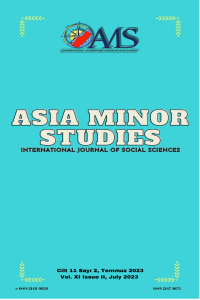Rusya'nın Orta Doğu Politikası: Putin Dönemi
Russia’s Middle East Policy: The Period of Putin
Author(s): Aleaddin Yalçınkaya, Soner DoğanSubject(s): International relations/trade, Transformation Period (1990 - 2010), Present Times (2010 - today), Geopolitics, Peace and Conflict Studies
Published by: Kilis 7 Aralık Üniversity
Keywords: Russia; Putin; Middle East; Arap Spring;
Summary/Abstract: Since Russia was dealing with domestic problems after the collapse of the Soviet Union, it could not show sufficient attention to global problems, especially the Middle East. Vladimir Putin, who seized power in the 2000s, has been in an active search in foreign policy for Russia to reach its effectiveness in the USSR period by solving the problems in the country in a short time. With the emergence of chaos in the international arena due to the September 11 attacks in the United States, Putin began to revive bilateral relations with the countries where the USSR had influence, especially with the former Soviet Republics. Putin started military operations in the surrounding countries to neutralize the unipolar superpower model of the USA, which started with the collapse of the USSR and to remind Russia that it is a superpower again. In this context, it started to take concrete steps with the Georgian intervention in 2008 and the occupation of Crimea in 2014. Putin's Middle East policy initiated an active diplomatic attack to expand the sphere of influence during the Soviet era and to revive pacified relations. With the Arab Spring events that started in 2011, Russia has brought closer bilateral relations with Syria, Egypt, Iraq, Libya, and Gulf countries. Russia's support of the names in power in these countries was welcomed by the relevant states and contributed positively to bilateral relations. This situation strengthened Putin's influence in the Middle East. In this study, Putin's re-establishment policy in the Middle East has been examined. Russia's development of its political, military, and economic activity in the Middle East, establishing new bases, and becoming one of the decisive actors of the new era through proxy wars or direct interventions, after strengthening its near-periphery policy, is considered primarily as an expansion of the post-Soviet Eurasian approach. It is concluded that the strategic transformation of Putin's Russia, which skillfully used its geopolitical advantages in this process, brought the Realist great power policy back to the agenda.
Journal: Asia Minor Studies
- Issue Year: 2023
- Issue No: 2
- Page Range: 206-220
- Page Count: 15
- Language: Turkish

